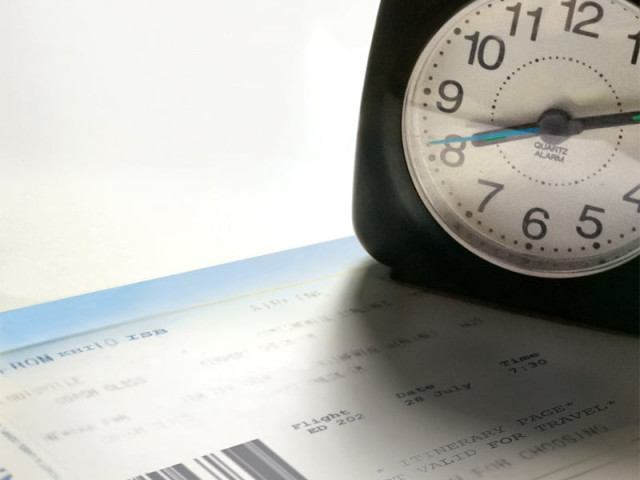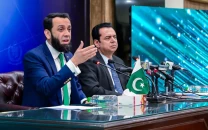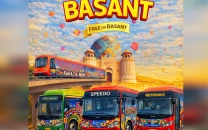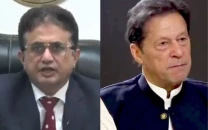Airblue: The boy who lived
On 28th July last year, at 7:50 am, Alvi was scheduled to be on board Air-Blue flight ED-202...

Airblue: The boy who lived
On 28th July last year, at 7:50 am, Alvi was scheduled to be on board Air-Blue flight ED-202, on his way to Islamabad to attend the last session of the Youth Parliament of Pakistan. At 9:25 am, the flight, which carried 152 passengers including five children, two infants and six crew members, crashed near Islamabad in the Margalla Hills. There were no survivors.
When the flight’s passenger list became public, Alvi’s name began surfacing on news channels and websites. He was included in the list of victims of the crash, and everyone thought he was dead.
It seems like Alvi still finds it difficult to accept that he isn’t. “I have calculated the odds of not boarding a flight that is going to crash again and again and again. They are close to zero,” says Alvi slowly. “The probability is less than getting attacked by a shark and surviving.
The night before the crash, Alvi sat with his parents, talking about the session of the Youth Parliament of Pakistan he was flying to Islamabad to attend along with nine of his fellow parliamentarians. It was going to be an exciting session, this last one, since it was to be attended by some of the country’s most prominent ministers and ambassadors, including prominent politicians such as Ahsan Iqbal, Shahbaz Sharif and Raza Rabbani.
But Alvi couldn’t shake an odd feeling about his trip to the capital, a feeling he’d been having ever since he first received his ticket in the mail two days before the flight. “I had such a strong feeling that I wasn’t going to take this flight,” he says. “I was hesitant, hesitant to the point that… I don’t know how I can describe this… but I just knew I wasn’t going to take that flight,” says Alvi, “In fact I kept on telling myself : ‘I can’t take it’.”
Looking back, he feels like he kept inventing reasons to stay in Karachi. He didn’t want to leave his father, who is also his boss at Alvi Petroleum, to handle their family business by himself. “But he insisted I had to go. ‘Don’t worry about work, just get on that flight’,” he told me,” says Alvi.But fate had other plans.
The morning of the crash, Alvi opened his eyes at 8 am. He realised he had missed his flight and was sure that he would start getting calls at noon from his friends at the parliament session when they noticed he was missing. On his way to work he grabbed his plane ticket and put it in his pocket. Alvi reached work at 9:30 am and logged onto a news website, only to see a item about a plane crash near the Margalla Hills.
“I was shocked, but not even for a second did I consider that this could be the same plane I had missed,” he says. The very next minute, his phone rang, and it was Khizer Pervaiz, a fellow parliamentarian who had also missed his flight to attend a meeting. “He heard my voice and started to cry,” says Alvi. “I remember exactly what he said, very clearly: ‘They’re all dead!’” All of Alvi’s fellow parliamentarians, along with the other hapless passengers on that flight, had become victims of a deadly plane crash.
After taking Pervaiz’s call, Alvi went straight home. He walked into his house to find his father a tearful mess, muttering apologies amidst his sobs. “He remembered how he kept insisting that I board the flight,” recalled Alvi, “and it broke my heart to see him like that.”
For Alvi, the next few days were a bit like dying but coming back to attend his own funeral. “My close friends said they did not have the courage to pick up the phone and call me and see if I would answer or not,” he says, “and I kept thinking about what my parents would have gone through if I had died.”
But this was not the only conflict Alvi had to deal with. While he was being strong for his friends and family, Alvi was also dealing with survivor’s guilt and grief for his friends’ deaths. Alvi was painfully aware that he was alive, perhaps, for no other reason than that he could afford to miss his flight that day.
“The tickets were free for us, sent to us by the government. If we wanted to change our dates or work around our schedule, we had to pay an additional Rs1,200. If you deliberately missed a flight, you had to pay for the cost of the ticket out of your own pocket as a penalty. I come from a wealthy family; I didn’t really care about how much I would have to pay if I missed the flight, but the others didn’t have that luxury. In fact, I remember that once Bilal Jung’s trip was clashing with his exams, and he went out of his way to get his exam dates changed so that he would not have to miss the flight and pay the penalty fee.”
A couple of months ago, Alvi made his way to the Karachi Marriott, where the Youth Parliament held a memorial for those who had lost their lives in the crash. He knew that the parents of his deceased friends would be attending. He was soberly dressed and had an excellent speech prepared, but as he got closer to the venue, fear overtook him. How many of these parents would wonder, when they looked at him, why Alvi got to live and their child didn’t? As he entered the room, Alvi’s eye fell on the stage, where six photographs hung against the backdrop, and a row of parents sat before them. Alvi knew that his own picture could easily have been up there, and his own parents could have been seated on that platform.
However, when he met his friends’ parents, they were very warm to him, and told him that they had heard all about him from their children. Realising that he had benefited from knowing his friends, even for a short time, helped release some of Alvi’s grief, even though the emotion, along with anger, still resurfaces now and then.
“I don’t know what I’m angry at,” says Alvi. “But I am just so angry. Angry at a force I cannot control, some call it fate, some say it’s the pilot’s fault and some call it an error.”
Alvi is silent for a while and then adds: “I’ve lost six friends. I’m angry because it wasn’t their fault. I’m angry because they were harmless, upstanding bright Pakistanis who believed in a better Pakistan. I felt this desire emanate from them because I worked with them, and this anger will not subside for a while.”
Published in The Express Tribune, Sunday Magazine, July 31st, 2011.
COMMENTS (41)
Comments are moderated and generally will be posted if they are on-topic and not abusive.
For more information, please see our Comments FAQ



















Also, may I add, that the only reason it seems though he was not inclined to take the flight or attend the meeting. He has a good life, financially stable etc (MashAllah) and despite his father's insistence to go, he did not miss the flight in traffic or as a conscious decision but by over sleeping ( laziness?). Sure, he is honest in admitting that his financial situation did not let him value the ticket or the event as much as others from lesser fortunate backgrounds - but again it just shows a lack of respect and enthusiasm .. if laziness saved him. its the best attribute he has..but then maybe he should not have written this article. I dont know. but this article has made me very uneasy with this whole subject.
God give you a long life Alvi, and may you live to make your parents happy!
sometimes waking up late is all you need to live ..
I know so many people who died in that flight.And although its illogical.. I am uneasy every-time I or someone I know takes a morning flight from Karachi to Islamabad. I havent flown air blue at that time..
I remember hearing the crash, seeing the smoke amidst the crazy rain that poured that day.. and the next. Islamabad was flooded, there was no electricity, cars stuck in roof-high waters, my car almost swayed in to a sewage stream ..it seemed like the end of times.
Find strength in your faith Alvi. It is not for you to be angry or sad or happy but for you to be thankful. Recognise that you had a second change no one else did. Be thankful.
I lost a friend in that plane crash. He was on official duty serving the affectees of the Attabad Lake in Hunza. It wasn't until the next day (which would've been his birthday) that I got to know about his sad demise. All of us were shocked at this tragic event. I hope that his 2 year old grows up to know that his father lost his life in the line of duty, and that he was loved by his friends.
Alvi missed the flight because it wasn't his time to go. Maybe because his work here is not done yet. I can also understand his emotions of guilt and anger. All it shows is that he's human. May he come out of his grief as a stronger person (amen).
**> Shamas-ur-Rehman Alvi should be dead.
Could have been written in much better words.
Dear brother Alvi, Honestly speaking you should be thankful to Allah. You never bothered to mention His name at all. Blaming fate wouldn't be fruitful brother. Its such a shame that people have lost their faith in Allah. You should pray for the friends you lost, instead of living with a guilt. He has every reason to call back any creation of His, anytime that has written for them. I wouldn't go any further.
May Allah bless all the people who lost their lives a place in Jannah and give patience to their family and loved ones. Aameen!
Sincerely, Survivor - Third life.
Jisay Allah Rakhay Ossay Kaun Chakhay - - - - - Inna Lillahe wa Innalehay Wa Rajeoon for those who lost their lives in the Crash......
Regards
Dr. Saleem Siddiqi Johannesburg - South Africa
well, Alvi, the angel of death can't just take you for granted. He was not told to take you along. So, you have a chance to make a living before he arrives with the appointment letter. God make us wiser enough to understand the purpose of our living. Ameen.
Alvi, I can understand your feelings and from what I am experiencing these feelings wont go away even as the time passes, you can only think and think and question you self. I lost my brother in Operation Rah-e-Rast he was a capt in army, its been couple of years that he met Shahdat and after this incident I till date dont get enough courage to even look at his photo, it tears me apart the thoughts i get in my mind when I think of him, the last time we spoke, the last hug we gave each other.....
He was younger than me, why am i living, where is he? is he alright, does he miss me as much as I miss him, does he think of me? so many things we planned to do together now all I am left with is his thoughts, his smiles, his jokes, his uniform..
I really dont think this article was needed.
This is an engaging story told well.
However, the truth is that virtually on every commercial flight something like this happens. You over-sleep, get stuck in a traffic jam, and so on. IF that missed flight ends up in disaster (against 99.9999% odds that you WILL reach your destination safely), it becomes a huge story.
This gave me goosebumps and brought tears to my eyes. I knew people on that flight too but not as closely as you did. I can't begin to imagine what you must have been going through. May Allah bless their souls.
Why we have received no answers for the crash even a year after the incident is beyond me. I know it won't being back those people but will probably help give closure to the friends and family.
he is not Harry Potter btw
May Allah rest their souls in peace...
Alvi this is probably a sign to you...you need ot take up your friend's fight! We need answers for the reason behind the plane crash...i cannot imagine even what the family must be going through...first to lose family liek that and then for there to be no answers :(
This is an amazing story and almost had me in tears! It was just not Alvi's time to go, that's all! We all have our times to go from this world and no one can avoid that time. Everything in this world will taste death one day.
@Anwar: You think that's funny? He missed the flight cuz he woke up late.... "The morning of the crash, Alvi opened his eyes at 8 am.". The flight was at 7.50am.
I would prefer to die at Margala Hills than to live in Karachi..
God if so has only created the means and reasons for the plane to crash. Gravity being one of them. Everything else is in our hands. There was no marzi in all of this.
He needs to pick himself up and fight for his fallen brothers and sisters. The law of probability is not unkind or kind to anyone.
Alvi should be Thankful to Almighty Allah for another life..and surely must have been be very painful for him to face his expired friends parents... While i was reading this article i literally had goosebumps and i was imagining that day when i got up early morning, switched on the tv and saw the whole coverage had tears in my eyes... May Allah rest their soul in peace Ameen..
May God rest their soul in peace :'(
We never learn any thing, even tragedy was not enough for us to rise against flight. The political affiliations and power halted all investigation to a standstill. Mr. Abbasi, the powerful MNA & a key position holder in airblue definitely has proved faithful to his company rather than Pakistan & its people. We all have become so worthless for these people...... : Why a Member of NA/PA or Senator is left to hold any key position in Public/Private entity? A company paying them millions in monthly stipend/salary will be prime for them or we, the creepy creatures of this land? : We as masses & even the survivors do not have any will and courage to sit in, till these ruthless & man eating leaders and killers get lost....!
Mr. Alvi, ALLAH THE ALMIGHTY, has given you a great chance to serve the mankind. I believe you are young, well educated, energetic and groomed personality, like other youngsters of youth Parliamentarians. Kindly work for service of humanity, alongwith your business activities, this way you can thank GOD
@mahwish: With all due respect to Alvi and others - I can comprehend the whole episode and it is immeasurably sad . . . what I cannot comprehend is where Mahwish learnt to spell. Awful spelling Mahwish - simply awful.
our lives are His possession, when He takes, its for Him to take. all v can do is be prepared to face Him in 'aakhirat', and not go in a state where He won't be happy with us. must be a great trial for the parents, all they can do is 'sabr', so they can get the reward in the hereafter. our Prophet (pbuh), all but one of his children died during his life time. still i understand its easier said than done
Maybe he missed his flight because of traffic.
I cried. A emotional experience. This very article.
All I can say is make the most of your 'second life'. Pakistan needs people like you and those who lost their lives.
It is a very moving account. I pray the family members of the deceased passengers find solace.
very moving. not only is it a painful reminder of what happened a year back, it also is a reminder that none of us know who, where, how or when will we die. life is the most unpredictable thing ever and its ultimate reality is death. maybe its about time we all reconsider our priorities. what if I ever to die today, am I happy and content about meeting my Lord? have I done enough to ensure a peaceful hereafter? does these things that I am indulged in really matter in the end?
may Allah give you courage and hope and a reason to live for. but please donot overburden yourself by thoughts of why was I left to live. do not cease to enjoy the simple things in life. smile. pray. spend time with your parents. do charity work. constantly read Quran for the deceased souls as only this will help them now. InshAllah, someday you will find peace:)
they're in a much much better place alvi..and at much peace
speechless.. u made me cry! how did his mother feel. This confirms presence of spiritual link which exists.. what were those feelings which were pricking him ...may be voice from the heaven, "your time is not yet up........."
The will of God will never lead you to where the grace of God cannot keep you!
May Allah Rest Their Soul In Peace. Ameen!
It gave me goosebumps.. Must've been really hard for you.. May Allah bless you and over come the trauma.. It wasnt your fault.. You deserve to live because it wasn't your time then.. May be you've been selected for a task, yet to be completed
God's ways are higher than our ways. His thoughts are higher than our thoughts. He knows from the beginning to the end. What we think is "good or bad" may or may not be. (We are not God...) Alvi's anger is understandable. My heart goes out to this boy and the families involved. May his anger be released and peace abound in his heart and soul. May his wounds be healed with mercy and love. May compassion overflow in his mind and heart to confound the 'wise' and bring peace to himself and others. Peace
Heart breaking yet true. Fate has its own ways. This article left me in tears.
Event was deadly sad.
Alvi not being on that plane would be considered a 'miracle of god' by most of us.
How can such a thing be a 'miracle of god' when one survives yet a 152 die?
Alvi's anger at his fate is justified. All of the deceased dreams and aspirations and lives and futures vapourised on the Margalla hillside.
'Jo Allah ki Marzi'. what kind of 'marzi' is that??!
leaves me in tears :( RIP the passengers of ED-202
I am emotionless myself alongwith speechless, what he is going through and went, cannot be better said that this writer.
All I can, that this was your faith Alvi, if we know that our death is hanging would we all go.
Allah has much bigger purpose for you, he left you so that you can tell others hows those 6 friends of yours live their purposeful lives rather than ours meaningless one.
Stand up your friends wanted you to speak what they hold, you are their voice now!!!
God!